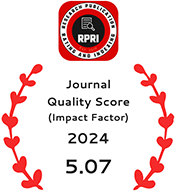The Effect of the Pituitary Gland on the Hormone Prolactin and Its Relationship to Menstrual Irregularity According to Obesity
DOI:
https://doi.org/10.55544/jrasb.3.1.47Keywords:
Hyperprolactinemia, infertility, obesity, thyroid problemsAbstract
Background; Thyroid dysfunction has a substantial effect on the functioning of menstruation and the fertility of women. Hypothyroidism often coincides with increased prolactin levels, which worsens the disease.
Research objectives; A cross-sectional study was undertaken in the infertility outpatient department of the University Teaching Hospital in Iraq, specifically examining the medical records of women who had undergone infertility evaluations. The study examined pertinent historical information, clinical observations, and findings from several investigations, such as thyroid function testing and blood prolactin level assessment. Descriptive and inferential statistical techniques were used to ascertain the prevalence and associations between predictors and outcome variables.
Aim of the study; The objective of this study was to evaluate the prevalence of thyroid diseases among infertile women who are seeking treatment at the outpatient department of University Teaching Hospital in Iraq. Furthermore, it sought to examine the correlation between hypothyroidism and hyperprolactinemia with obesity, a subject that has not been thoroughly studied in our population.
Novelty; Out of the 200 participants, the largest group, comprising 90 individuals (42%), were categorized as obese. The mean body mass index (BMI) of the subjects was 24 ± 4 kg/m2. The prevalence of thyroid disorder was 18%, with hypothyroidism representing 13% and hyperthyroidism representing 4%. No significant correlation was observed between BMI and hyperprolactinemia in people diagnosed with thyroid illness. Furthermore, no noteworthy correlation was found between BMI and hyperprolactinemia as an isolated condition. Nevertheless, a notable direct association was observed between thyroid stimulating hormone (TSH) and prolactin levels. Thyroid abnormalities and hyperprolactinemia are common in women who have difficulty getting pregnant. Therefore, it is advisable to regularly screen for these problems during the initial evaluation of infertility. While there was no notable association between BMI and thyroid illness and hyperprolactinemia, it is important to acknowledge the potential influence of weight gain on infertility, especially given that the majority of participants in the research were obese.
Downloads
Metrics
References
Richard OB, Daniel JS, Myelene WY. Berek and Novak’s gynecology. 14th ed. Philadelphia: Lippincot Williams and Wilkins; 2007. Chapter 30, Infertility; 1185-275.
Inhorn MC. Global infertility and the globalization of new reproductive technologies: Illustrations from Egypt. Soc Sci Med. 2003 May; 56(9): 1837–51.
Elahi S, Tasneem A , Nazir I, Nagra SA, Hyder SW. Thyroid dysfunction in infertile women J Coll Physicians Surg Pak. 2007 April; 17 (4): 191-94
Orazulike NC, Odum EP. Evaluation of thyroid function in infertile female patients in port harcourt, Nigeria. Trop J Obstet Gynecol. 2018;35(1): 38-43.
Hivre MD, Bhale DV, Mahat RK, Bujurge AA. Study of Serum TSH and Prolactin Levels in Patients of Female Infertility International Journal of Recent Trends in Science And Technology. 2013; 9(1):144-45
Priya DM, Akhtar N, Ahmad J. Prevalence of hypothyroidism in infertile women and evaluation of response of treatment for hypothyroidism on infertility. Indian J Endocrinol Metab. 2015 Jul;19(4):504–6.
Verma I, Sood R, Juneja S, Kaur S. Prevalence of hypothyroidism in infertile women and evaluation of response of treatment for hypothyroidism on infertility. Int J Appl Basic Med Res 2012;2:17-9.
Manandhar R, Manandhar BL, Sharma J. Thyroid Profile in Infertile Women. Nepal Med J. 2018;1(01):19–24.
Pushpagiri N, Gracelyn L, Nagalingam S. Prevalence of subclinical and overt hypothyroidism in infertile women. Int J Reprod Contraception, Obstet Gynecol. 2015;1733–8.
Rijal B, Shrestha R, Jha B. Association of thyroid dysfunction among infertile women visiting infertility center of Om Hospital, Kathmandu, Nepal. Nepal Med Coll J 2011; 13(4): 247-49.
Seth B, Arora S, Singh R. Association of obesity with hormonal imbalance in infertility: A cross-sectional study in North Indian Women. Indian J Clin Biochem. 2013;28(4):342–7.
Ratnaparkhe V, Shah H, Upadhyay K. Link between Infertility, Overweight and Subclinical Hypothyroidism. Int J Health Sci Res. 2020 February; 10(2): 10-17
Misra A, Chowbey P, Makkar BM, Vikram NK, Wasir JS, Chadha D, Joshi SR, Sadikot S, Gupta R, Gulati S, Munjal YP, Concensus Group. Consensus statement for diagnosis of obesity, abdominal obesity and the metabolic syndrome for Asian Indians and recommendatiions for physical activity, medical and surgical management. J Assoc Physicians India. 2009 Feb;57:163–70.
Sharma P, Pal A, Sood R, Jaswal S, Thakur S, Sharma A. Correlation of prolactin and thyroid disorders in infertile women. Int J Reprod Contracept Obstet Gynecol. 2017 Feb;6(2):649-653
Akhter N, Hassan S. Sub-clinical hypothyroidism and hyperprolactinemia in infertile women: Bangladesh perspective after universal salt iodination. The Internet Journal of Endocrinology.2008; Vol. 5 (1)
Gupta MK, Singh A. Study on Thyroid Hormone, FSH, LH and Prolactin Levels in Patients with Primary Infertility: A Hospital Based study. J Med Sci Clin Res. 2016 Jul; 4(7): 11435-11439
Downloads
Published
How to Cite
Issue
Section
License
Copyright (c) 2024 Raghad Tahseen Thanoon, Takea Shaker Ahmed

This work is licensed under a Creative Commons Attribution-NonCommercial-NoDerivatives 4.0 International License.


















